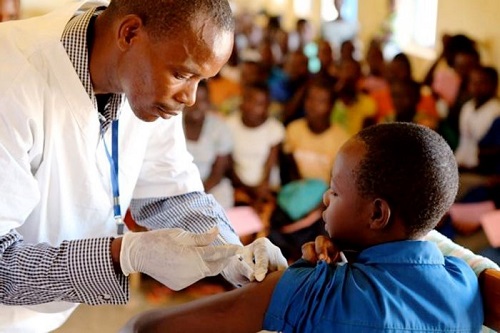* 20m Nigerians suffer from hepatitis infection
The federal government has said that it is committed to spending $3 billion to scale up immunization in the country.
It said the programme will be implemented through ‘Nigeria’s Strategy on Immunization and PHC Systems Strengthening (NSIPSS)’.
The government also said that the number of Nigerians suffering from acute hepatitis infection as at 2018 was 20 million.
It said that a National AIDS Indicator and Impact Survey conducted in 2018 showed a prevalence of 8.1 per cent for Hepatitis B (HBV) and 1.1 per cent for Hepatitis C (HCV).
The Minister of Health, Dr Osagie Ehanire, who gave the statistics at this year’s World Health Organization (WHO) virtual high-level commemoration of World Hepatitis Day and launch of the guidelines for prevention of mother-to-child transmission of Hepatitis-B, said that the federal government is working in alignment with the regional resolution to reduce chronic Hepatitis B virus infection to less than 2 per cent in children under five years by the end of this year.
Ehanire said: “One of the major challenges of Hepatitis B birth dose vaccination was the inadequate domestic contribution to finance vaccines and expand access to services. In recent times, Nigeria has made important progress in this area. We are committed to a $3 billion Nigeria Strategy on Immunization and PHC Systems Strengthening (NSIPSS).”
He explained that the plan is for the transitioning to financial ownership of the immunization and primary health care system over a 10-year period, from 2018-2028.
According to him, the plan aimed at addressing inequities in the uptake of routine vaccines and improvement of coverage for HBV Birth dose, adding that in 2019, Hepatitis HBV birth dose coverage was 59 per cent.
He said that Nigeria is endemic for both viral hepatitis B and C.
Ehanire said: “In 2018 Nigeria conducted a National AIDS Indicator and Impact Survey, which showed a prevalence of 8.1 per cent for Hepatitis B (HBV) and 1.1 per cent for Hepatitis C (HCV). We could estimate that about 20 million people are chronically infected.”
He said that Nigeria was one of the first African countries to introduce a birth dose of HBV vaccine in 2004.
According to the minister, the country followed up by establishing the National Viral Hepatitis Control programme in 2013, to coordinate all national efforts and through this, developed national documents, including policies, a strategic plan, guidelines, training materials and a treatment centre directory.
“An important next step is establishing a routine surveillance system to improve on our reporting on the Global Hepatitis Surveillance Systems (GHSS) platform.
“We hope to continue to increase coverage as we work towards elimination. It is important to note that Nigeria has not defaulted in its co-financing obligations of routine immunization implementation for the past three years.
“We have also worked on strengthening routine immunization through the establishment of a National Emergency Routine Immunization Coordination Centre (NERICC) in 2017 and there have been several gains through the creation of this platform. For example, its heavy focus on supply chain management has helped to improve availability of vaccines at district and facility levels,” he said.



